MGT5MPT Essay: Strategic Choice vs. Determinist Theories Analysis
VerifiedAdded on 2023/06/11
|8
|2349
|192
Essay
AI Summary
This essay critically evaluates strategic choice and determinist theories (Resource Dependency Theory, Institutional Theory, and Population Ecology) in the context of organizational action. It explores the philosophical underpinnings, decision-making processes, and environmental considerations of each theory. The paper argues that while strategic choice theory, which posits that organizations can influence their market position and consumer behavior, is generally more compelling, various factors limit managerial discretion. The analysis contrasts strategic choice with deterministic views, which emphasize the market's control over organizations. The essay concludes by highlighting the adaptability of strategic choice theory and its capacity to manage factors affecting profitability, making it a more effective approach for organizational structuring. Desklib provides access to similar essays and study resources for students.
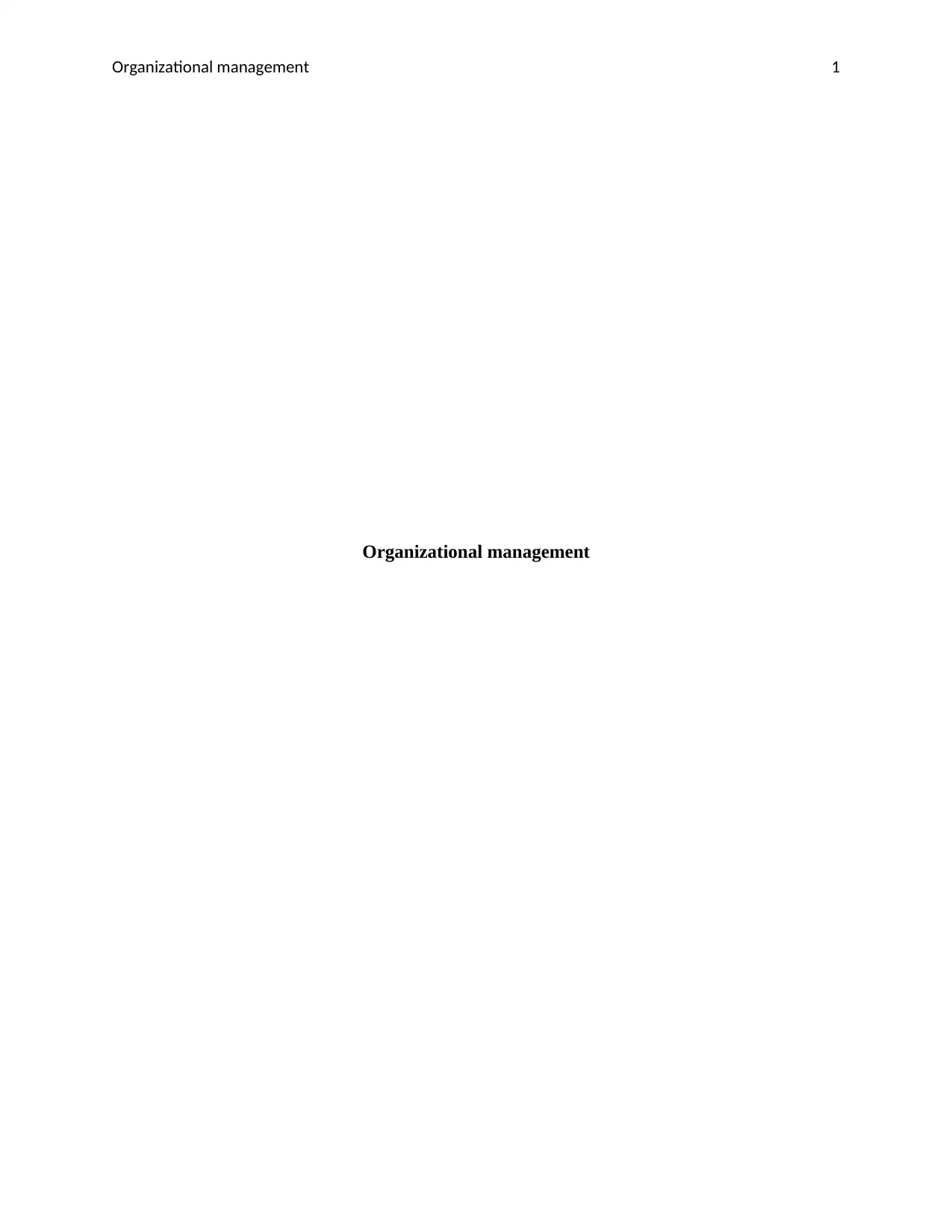
Organizational management 1
Organizational management
Organizational management
Paraphrase This Document
Need a fresh take? Get an instant paraphrase of this document with our AI Paraphraser
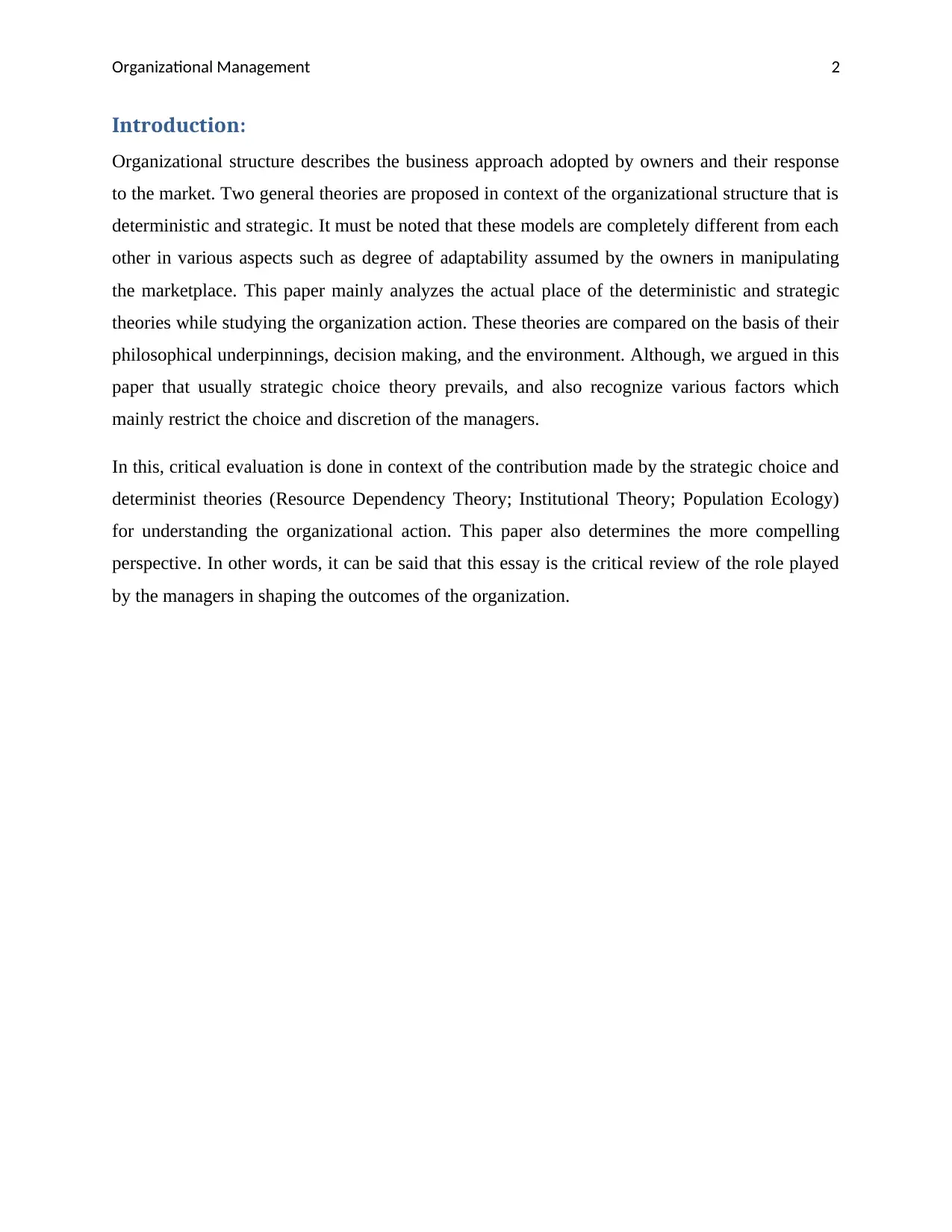
Organizational Management 2
Introduction:
Organizational structure describes the business approach adopted by owners and their response
to the market. Two general theories are proposed in context of the organizational structure that is
deterministic and strategic. It must be noted that these models are completely different from each
other in various aspects such as degree of adaptability assumed by the owners in manipulating
the marketplace. This paper mainly analyzes the actual place of the deterministic and strategic
theories while studying the organization action. These theories are compared on the basis of their
philosophical underpinnings, decision making, and the environment. Although, we argued in this
paper that usually strategic choice theory prevails, and also recognize various factors which
mainly restrict the choice and discretion of the managers.
In this, critical evaluation is done in context of the contribution made by the strategic choice and
determinist theories (Resource Dependency Theory; Institutional Theory; Population Ecology)
for understanding the organizational action. This paper also determines the more compelling
perspective. In other words, it can be said that this essay is the critical review of the role played
by the managers in shaping the outcomes of the organization.
Introduction:
Organizational structure describes the business approach adopted by owners and their response
to the market. Two general theories are proposed in context of the organizational structure that is
deterministic and strategic. It must be noted that these models are completely different from each
other in various aspects such as degree of adaptability assumed by the owners in manipulating
the marketplace. This paper mainly analyzes the actual place of the deterministic and strategic
theories while studying the organization action. These theories are compared on the basis of their
philosophical underpinnings, decision making, and the environment. Although, we argued in this
paper that usually strategic choice theory prevails, and also recognize various factors which
mainly restrict the choice and discretion of the managers.
In this, critical evaluation is done in context of the contribution made by the strategic choice and
determinist theories (Resource Dependency Theory; Institutional Theory; Population Ecology)
for understanding the organizational action. This paper also determines the more compelling
perspective. In other words, it can be said that this essay is the critical review of the role played
by the managers in shaping the outcomes of the organization.
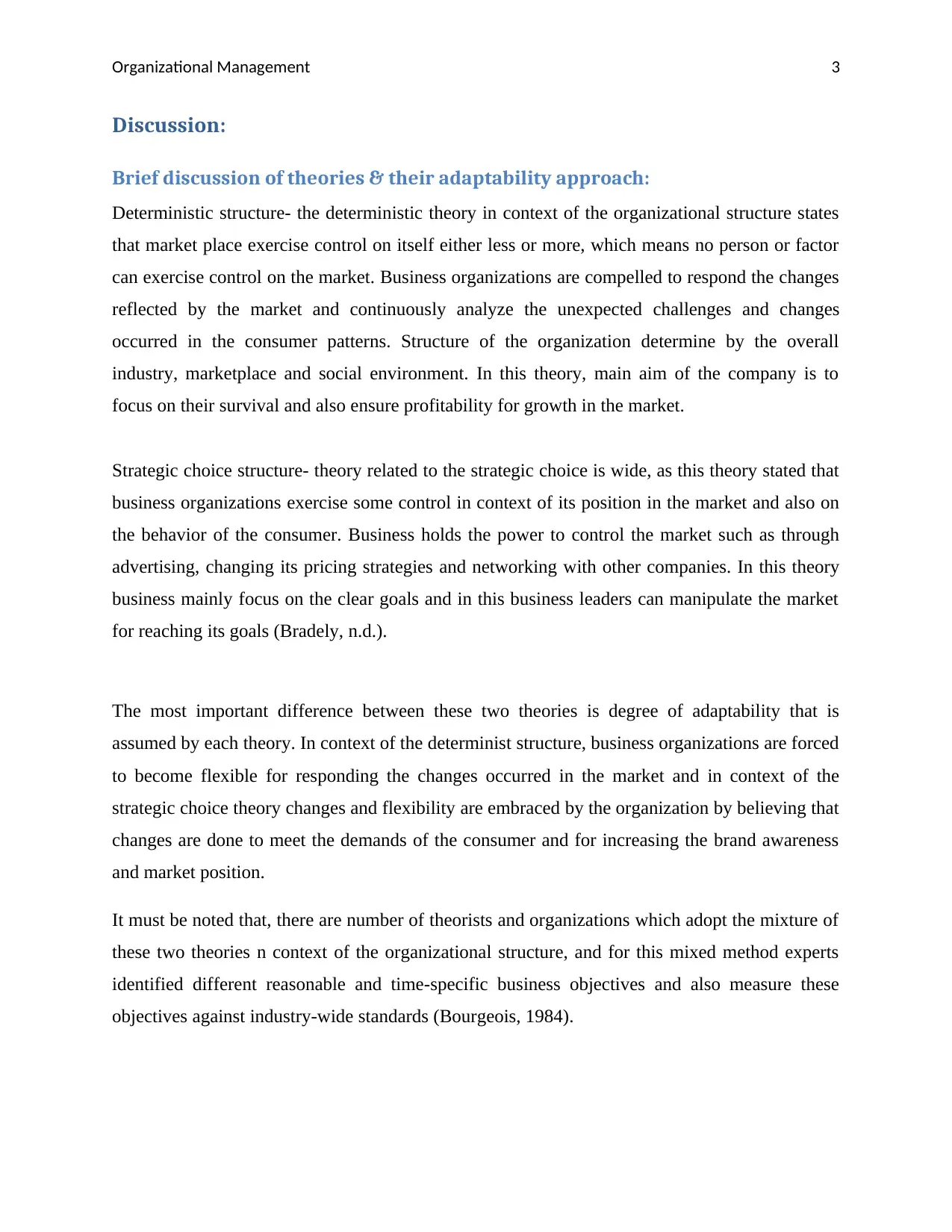
Organizational Management 3
Discussion:
Brief discussion of theories & their adaptability approach:
Deterministic structure- the deterministic theory in context of the organizational structure states
that market place exercise control on itself either less or more, which means no person or factor
can exercise control on the market. Business organizations are compelled to respond the changes
reflected by the market and continuously analyze the unexpected challenges and changes
occurred in the consumer patterns. Structure of the organization determine by the overall
industry, marketplace and social environment. In this theory, main aim of the company is to
focus on their survival and also ensure profitability for growth in the market.
Strategic choice structure- theory related to the strategic choice is wide, as this theory stated that
business organizations exercise some control in context of its position in the market and also on
the behavior of the consumer. Business holds the power to control the market such as through
advertising, changing its pricing strategies and networking with other companies. In this theory
business mainly focus on the clear goals and in this business leaders can manipulate the market
for reaching its goals (Bradely, n.d.).
The most important difference between these two theories is degree of adaptability that is
assumed by each theory. In context of the determinist structure, business organizations are forced
to become flexible for responding the changes occurred in the market and in context of the
strategic choice theory changes and flexibility are embraced by the organization by believing that
changes are done to meet the demands of the consumer and for increasing the brand awareness
and market position.
It must be noted that, there are number of theorists and organizations which adopt the mixture of
these two theories n context of the organizational structure, and for this mixed method experts
identified different reasonable and time-specific business objectives and also measure these
objectives against industry-wide standards (Bourgeois, 1984).
Discussion:
Brief discussion of theories & their adaptability approach:
Deterministic structure- the deterministic theory in context of the organizational structure states
that market place exercise control on itself either less or more, which means no person or factor
can exercise control on the market. Business organizations are compelled to respond the changes
reflected by the market and continuously analyze the unexpected challenges and changes
occurred in the consumer patterns. Structure of the organization determine by the overall
industry, marketplace and social environment. In this theory, main aim of the company is to
focus on their survival and also ensure profitability for growth in the market.
Strategic choice structure- theory related to the strategic choice is wide, as this theory stated that
business organizations exercise some control in context of its position in the market and also on
the behavior of the consumer. Business holds the power to control the market such as through
advertising, changing its pricing strategies and networking with other companies. In this theory
business mainly focus on the clear goals and in this business leaders can manipulate the market
for reaching its goals (Bradely, n.d.).
The most important difference between these two theories is degree of adaptability that is
assumed by each theory. In context of the determinist structure, business organizations are forced
to become flexible for responding the changes occurred in the market and in context of the
strategic choice theory changes and flexibility are embraced by the organization by believing that
changes are done to meet the demands of the consumer and for increasing the brand awareness
and market position.
It must be noted that, there are number of theorists and organizations which adopt the mixture of
these two theories n context of the organizational structure, and for this mixed method experts
identified different reasonable and time-specific business objectives and also measure these
objectives against industry-wide standards (Bourgeois, 1984).
⊘ This is a preview!⊘
Do you want full access?
Subscribe today to unlock all pages.

Trusted by 1+ million students worldwide
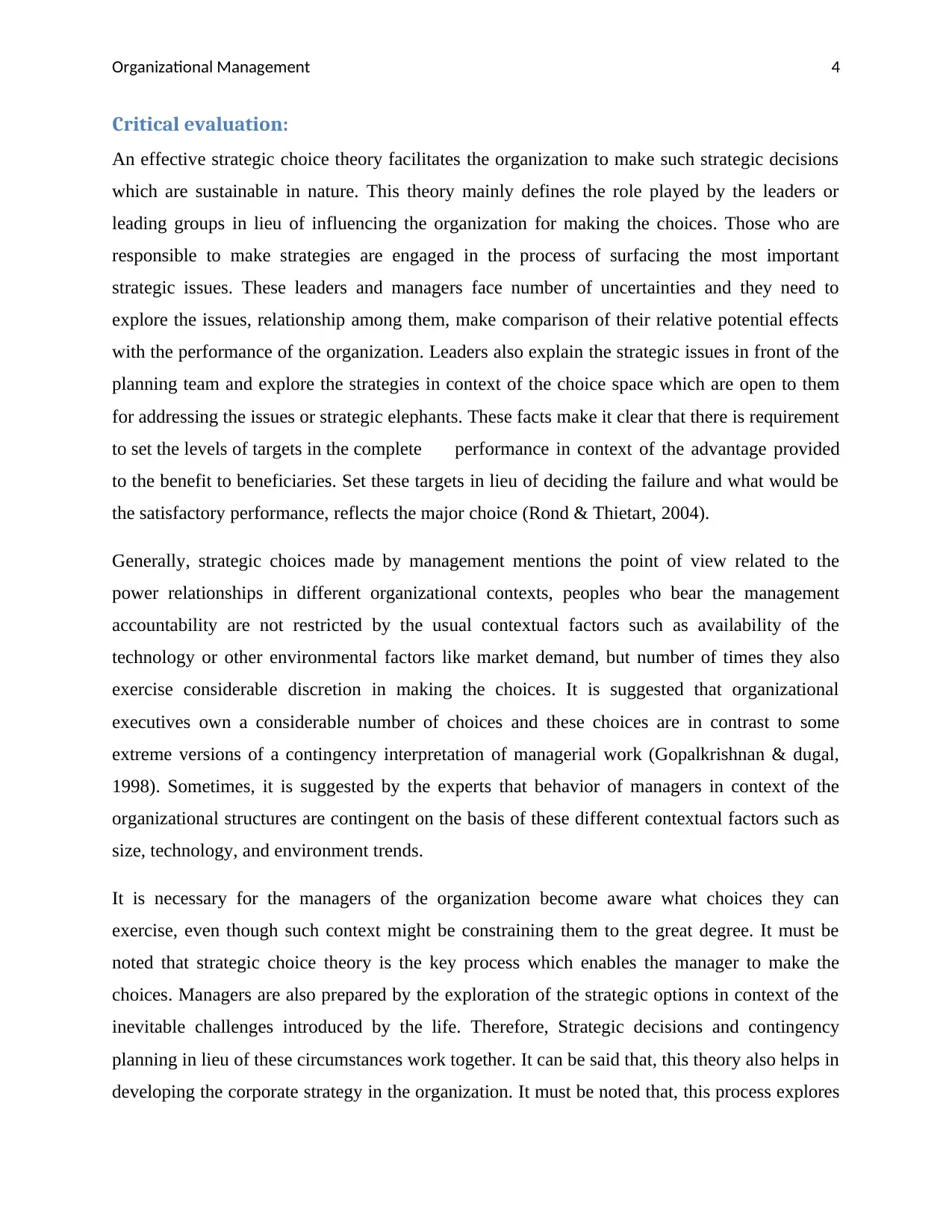
Organizational Management 4
Critical evaluation:
An effective strategic choice theory facilitates the organization to make such strategic decisions
which are sustainable in nature. This theory mainly defines the role played by the leaders or
leading groups in lieu of influencing the organization for making the choices. Those who are
responsible to make strategies are engaged in the process of surfacing the most important
strategic issues. These leaders and managers face number of uncertainties and they need to
explore the issues, relationship among them, make comparison of their relative potential effects
with the performance of the organization. Leaders also explain the strategic issues in front of the
planning team and explore the strategies in context of the choice space which are open to them
for addressing the issues or strategic elephants. These facts make it clear that there is requirement
to set the levels of targets in the complete performance in context of the advantage provided
to the benefit to beneficiaries. Set these targets in lieu of deciding the failure and what would be
the satisfactory performance, reflects the major choice (Rond & Thietart, 2004).
Generally, strategic choices made by management mentions the point of view related to the
power relationships in different organizational contexts, peoples who bear the management
accountability are not restricted by the usual contextual factors such as availability of the
technology or other environmental factors like market demand, but number of times they also
exercise considerable discretion in making the choices. It is suggested that organizational
executives own a considerable number of choices and these choices are in contrast to some
extreme versions of a contingency interpretation of managerial work (Gopalkrishnan & dugal,
1998). Sometimes, it is suggested by the experts that behavior of managers in context of the
organizational structures are contingent on the basis of these different contextual factors such as
size, technology, and environment trends.
It is necessary for the managers of the organization become aware what choices they can
exercise, even though such context might be constraining them to the great degree. It must be
noted that strategic choice theory is the key process which enables the manager to make the
choices. Managers are also prepared by the exploration of the strategic options in context of the
inevitable challenges introduced by the life. Therefore, Strategic decisions and contingency
planning in lieu of these circumstances work together. It can be said that, this theory also helps in
developing the corporate strategy in the organization. It must be noted that, this process explores
Critical evaluation:
An effective strategic choice theory facilitates the organization to make such strategic decisions
which are sustainable in nature. This theory mainly defines the role played by the leaders or
leading groups in lieu of influencing the organization for making the choices. Those who are
responsible to make strategies are engaged in the process of surfacing the most important
strategic issues. These leaders and managers face number of uncertainties and they need to
explore the issues, relationship among them, make comparison of their relative potential effects
with the performance of the organization. Leaders also explain the strategic issues in front of the
planning team and explore the strategies in context of the choice space which are open to them
for addressing the issues or strategic elephants. These facts make it clear that there is requirement
to set the levels of targets in the complete performance in context of the advantage provided
to the benefit to beneficiaries. Set these targets in lieu of deciding the failure and what would be
the satisfactory performance, reflects the major choice (Rond & Thietart, 2004).
Generally, strategic choices made by management mentions the point of view related to the
power relationships in different organizational contexts, peoples who bear the management
accountability are not restricted by the usual contextual factors such as availability of the
technology or other environmental factors like market demand, but number of times they also
exercise considerable discretion in making the choices. It is suggested that organizational
executives own a considerable number of choices and these choices are in contrast to some
extreme versions of a contingency interpretation of managerial work (Gopalkrishnan & dugal,
1998). Sometimes, it is suggested by the experts that behavior of managers in context of the
organizational structures are contingent on the basis of these different contextual factors such as
size, technology, and environment trends.
It is necessary for the managers of the organization become aware what choices they can
exercise, even though such context might be constraining them to the great degree. It must be
noted that strategic choice theory is the key process which enables the manager to make the
choices. Managers are also prepared by the exploration of the strategic options in context of the
inevitable challenges introduced by the life. Therefore, Strategic decisions and contingency
planning in lieu of these circumstances work together. It can be said that, this theory also helps in
developing the corporate strategy in the organization. It must be noted that, this process explores
Paraphrase This Document
Need a fresh take? Get an instant paraphrase of this document with our AI Paraphraser
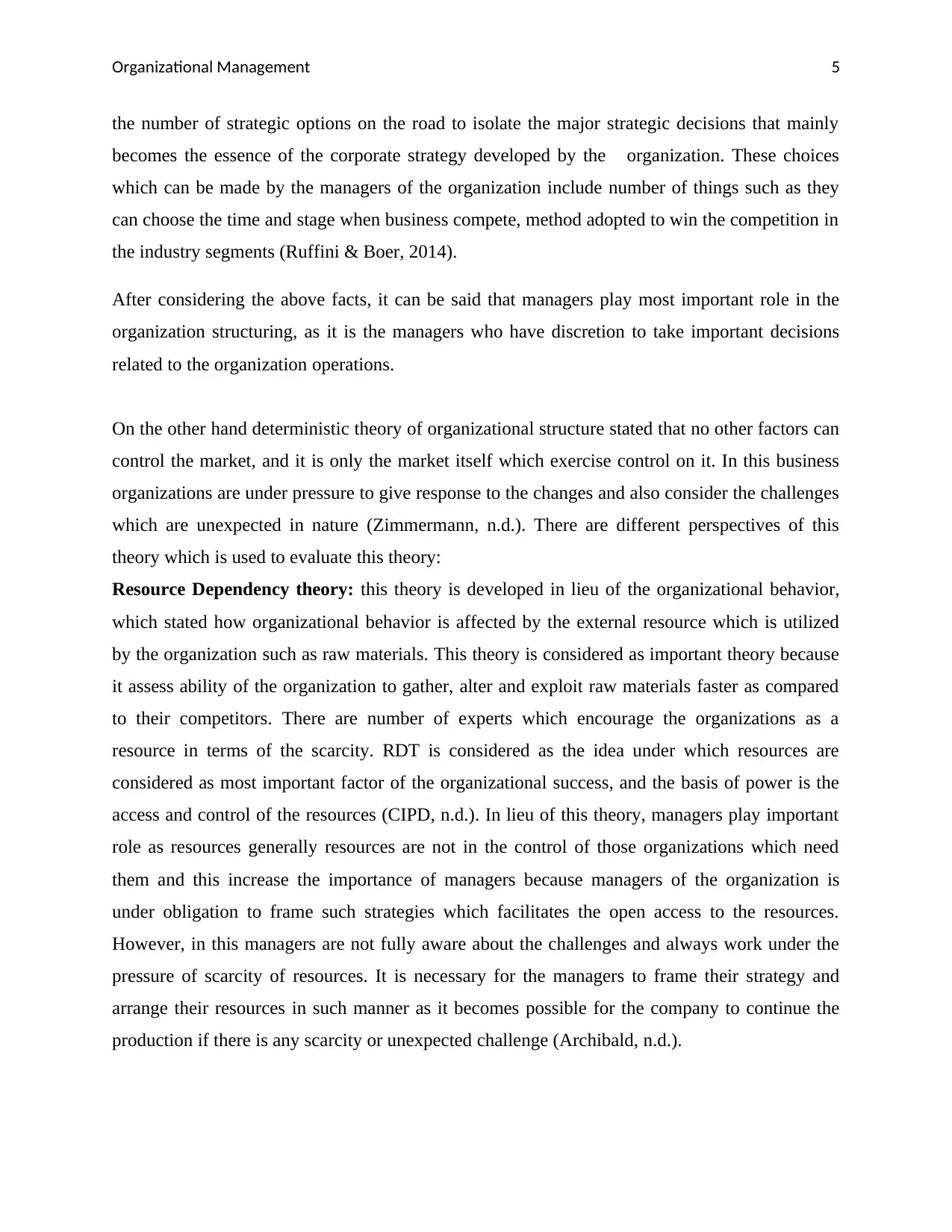
Organizational Management 5
the number of strategic options on the road to isolate the major strategic decisions that mainly
becomes the essence of the corporate strategy developed by the organization. These choices
which can be made by the managers of the organization include number of things such as they
can choose the time and stage when business compete, method adopted to win the competition in
the industry segments (Ruffini & Boer, 2014).
After considering the above facts, it can be said that managers play most important role in the
organization structuring, as it is the managers who have discretion to take important decisions
related to the organization operations.
On the other hand deterministic theory of organizational structure stated that no other factors can
control the market, and it is only the market itself which exercise control on it. In this business
organizations are under pressure to give response to the changes and also consider the challenges
which are unexpected in nature (Zimmermann, n.d.). There are different perspectives of this
theory which is used to evaluate this theory:
Resource Dependency theory: this theory is developed in lieu of the organizational behavior,
which stated how organizational behavior is affected by the external resource which is utilized
by the organization such as raw materials. This theory is considered as important theory because
it assess ability of the organization to gather, alter and exploit raw materials faster as compared
to their competitors. There are number of experts which encourage the organizations as a
resource in terms of the scarcity. RDT is considered as the idea under which resources are
considered as most important factor of the organizational success, and the basis of power is the
access and control of the resources (CIPD, n.d.). In lieu of this theory, managers play important
role as resources generally resources are not in the control of those organizations which need
them and this increase the importance of managers because managers of the organization is
under obligation to frame such strategies which facilitates the open access to the resources.
However, in this managers are not fully aware about the challenges and always work under the
pressure of scarcity of resources. It is necessary for the managers to frame their strategy and
arrange their resources in such manner as it becomes possible for the company to continue the
production if there is any scarcity or unexpected challenge (Archibald, n.d.).
the number of strategic options on the road to isolate the major strategic decisions that mainly
becomes the essence of the corporate strategy developed by the organization. These choices
which can be made by the managers of the organization include number of things such as they
can choose the time and stage when business compete, method adopted to win the competition in
the industry segments (Ruffini & Boer, 2014).
After considering the above facts, it can be said that managers play most important role in the
organization structuring, as it is the managers who have discretion to take important decisions
related to the organization operations.
On the other hand deterministic theory of organizational structure stated that no other factors can
control the market, and it is only the market itself which exercise control on it. In this business
organizations are under pressure to give response to the changes and also consider the challenges
which are unexpected in nature (Zimmermann, n.d.). There are different perspectives of this
theory which is used to evaluate this theory:
Resource Dependency theory: this theory is developed in lieu of the organizational behavior,
which stated how organizational behavior is affected by the external resource which is utilized
by the organization such as raw materials. This theory is considered as important theory because
it assess ability of the organization to gather, alter and exploit raw materials faster as compared
to their competitors. There are number of experts which encourage the organizations as a
resource in terms of the scarcity. RDT is considered as the idea under which resources are
considered as most important factor of the organizational success, and the basis of power is the
access and control of the resources (CIPD, n.d.). In lieu of this theory, managers play important
role as resources generally resources are not in the control of those organizations which need
them and this increase the importance of managers because managers of the organization is
under obligation to frame such strategies which facilitates the open access to the resources.
However, in this managers are not fully aware about the challenges and always work under the
pressure of scarcity of resources. It is necessary for the managers to frame their strategy and
arrange their resources in such manner as it becomes possible for the company to continue the
production if there is any scarcity or unexpected challenge (Archibald, n.d.).
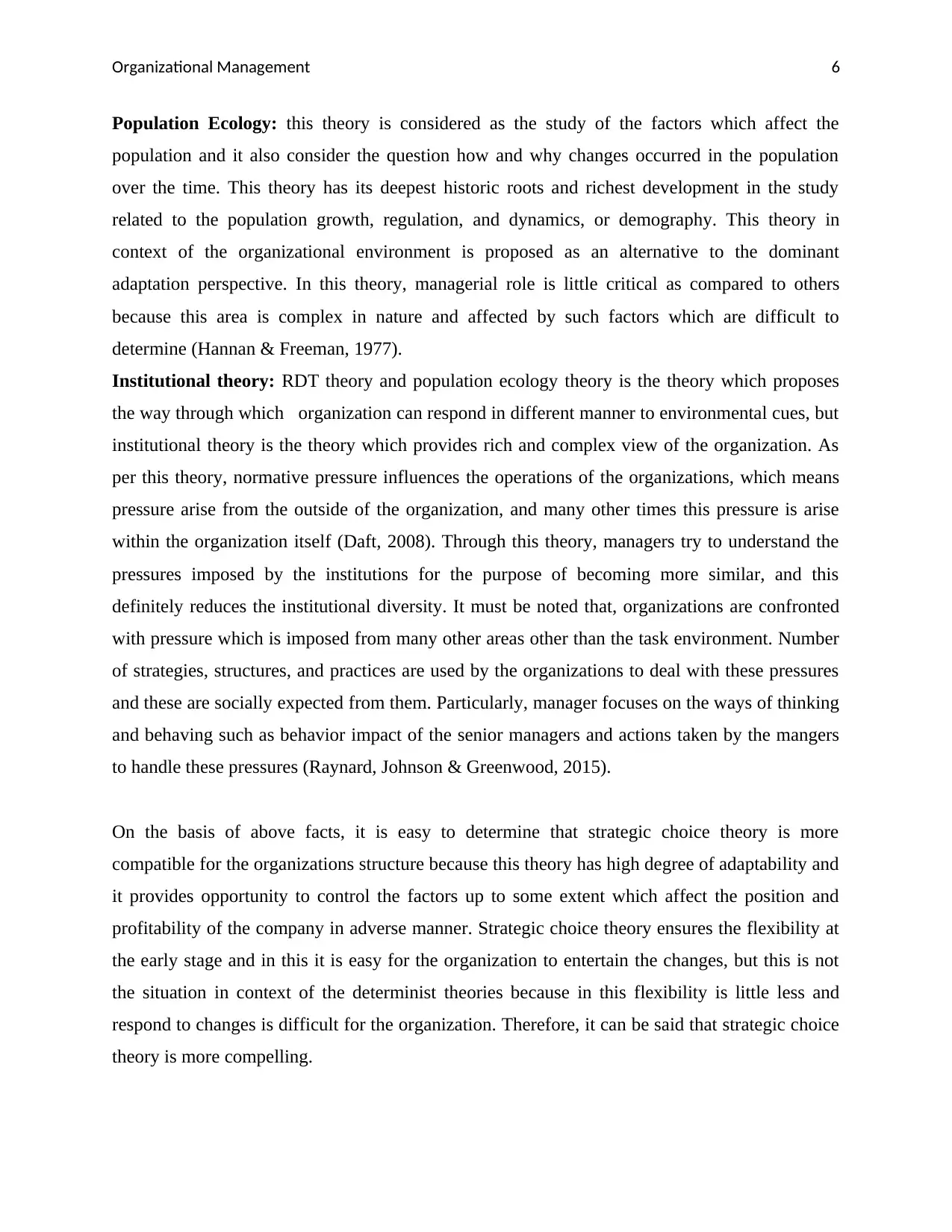
Organizational Management 6
Population Ecology: this theory is considered as the study of the factors which affect the
population and it also consider the question how and why changes occurred in the population
over the time. This theory has its deepest historic roots and richest development in the study
related to the population growth, regulation, and dynamics, or demography. This theory in
context of the organizational environment is proposed as an alternative to the dominant
adaptation perspective. In this theory, managerial role is little critical as compared to others
because this area is complex in nature and affected by such factors which are difficult to
determine (Hannan & Freeman, 1977).
Institutional theory: RDT theory and population ecology theory is the theory which proposes
the way through which organization can respond in different manner to environmental cues, but
institutional theory is the theory which provides rich and complex view of the organization. As
per this theory, normative pressure influences the operations of the organizations, which means
pressure arise from the outside of the organization, and many other times this pressure is arise
within the organization itself (Daft, 2008). Through this theory, managers try to understand the
pressures imposed by the institutions for the purpose of becoming more similar, and this
definitely reduces the institutional diversity. It must be noted that, organizations are confronted
with pressure which is imposed from many other areas other than the task environment. Number
of strategies, structures, and practices are used by the organizations to deal with these pressures
and these are socially expected from them. Particularly, manager focuses on the ways of thinking
and behaving such as behavior impact of the senior managers and actions taken by the mangers
to handle these pressures (Raynard, Johnson & Greenwood, 2015).
On the basis of above facts, it is easy to determine that strategic choice theory is more
compatible for the organizations structure because this theory has high degree of adaptability and
it provides opportunity to control the factors up to some extent which affect the position and
profitability of the company in adverse manner. Strategic choice theory ensures the flexibility at
the early stage and in this it is easy for the organization to entertain the changes, but this is not
the situation in context of the determinist theories because in this flexibility is little less and
respond to changes is difficult for the organization. Therefore, it can be said that strategic choice
theory is more compelling.
Population Ecology: this theory is considered as the study of the factors which affect the
population and it also consider the question how and why changes occurred in the population
over the time. This theory has its deepest historic roots and richest development in the study
related to the population growth, regulation, and dynamics, or demography. This theory in
context of the organizational environment is proposed as an alternative to the dominant
adaptation perspective. In this theory, managerial role is little critical as compared to others
because this area is complex in nature and affected by such factors which are difficult to
determine (Hannan & Freeman, 1977).
Institutional theory: RDT theory and population ecology theory is the theory which proposes
the way through which organization can respond in different manner to environmental cues, but
institutional theory is the theory which provides rich and complex view of the organization. As
per this theory, normative pressure influences the operations of the organizations, which means
pressure arise from the outside of the organization, and many other times this pressure is arise
within the organization itself (Daft, 2008). Through this theory, managers try to understand the
pressures imposed by the institutions for the purpose of becoming more similar, and this
definitely reduces the institutional diversity. It must be noted that, organizations are confronted
with pressure which is imposed from many other areas other than the task environment. Number
of strategies, structures, and practices are used by the organizations to deal with these pressures
and these are socially expected from them. Particularly, manager focuses on the ways of thinking
and behaving such as behavior impact of the senior managers and actions taken by the mangers
to handle these pressures (Raynard, Johnson & Greenwood, 2015).
On the basis of above facts, it is easy to determine that strategic choice theory is more
compatible for the organizations structure because this theory has high degree of adaptability and
it provides opportunity to control the factors up to some extent which affect the position and
profitability of the company in adverse manner. Strategic choice theory ensures the flexibility at
the early stage and in this it is easy for the organization to entertain the changes, but this is not
the situation in context of the determinist theories because in this flexibility is little less and
respond to changes is difficult for the organization. Therefore, it can be said that strategic choice
theory is more compelling.
⊘ This is a preview!⊘
Do you want full access?
Subscribe today to unlock all pages.

Trusted by 1+ million students worldwide
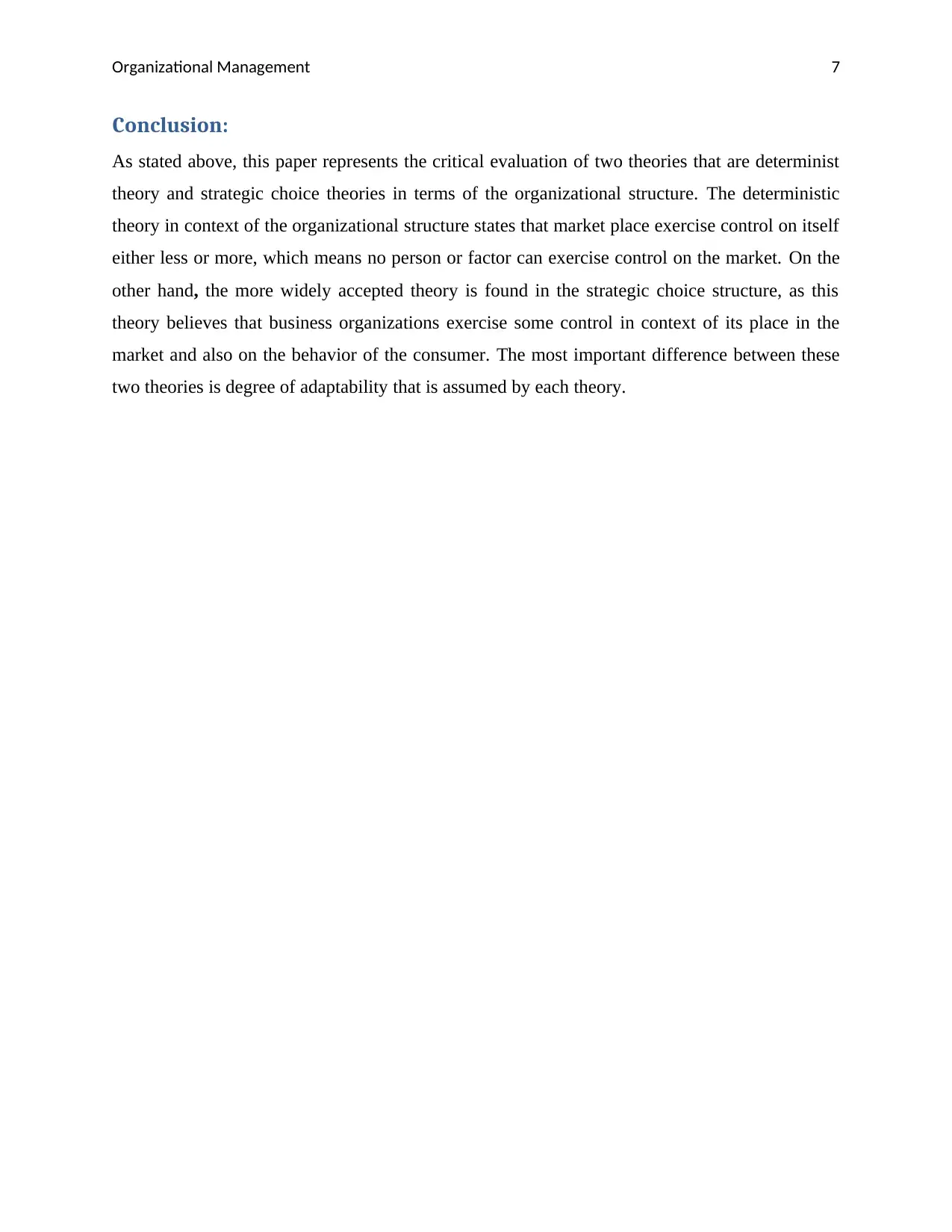
Organizational Management 7
Conclusion:
As stated above, this paper represents the critical evaluation of two theories that are determinist
theory and strategic choice theories in terms of the organizational structure. The deterministic
theory in context of the organizational structure states that market place exercise control on itself
either less or more, which means no person or factor can exercise control on the market. On the
other hand, the more widely accepted theory is found in the strategic choice structure, as this
theory believes that business organizations exercise some control in context of its place in the
market and also on the behavior of the consumer. The most important difference between these
two theories is degree of adaptability that is assumed by each theory.
Conclusion:
As stated above, this paper represents the critical evaluation of two theories that are determinist
theory and strategic choice theories in terms of the organizational structure. The deterministic
theory in context of the organizational structure states that market place exercise control on itself
either less or more, which means no person or factor can exercise control on the market. On the
other hand, the more widely accepted theory is found in the strategic choice structure, as this
theory believes that business organizations exercise some control in context of its place in the
market and also on the behavior of the consumer. The most important difference between these
two theories is degree of adaptability that is assumed by each theory.
Paraphrase This Document
Need a fresh take? Get an instant paraphrase of this document with our AI Paraphraser
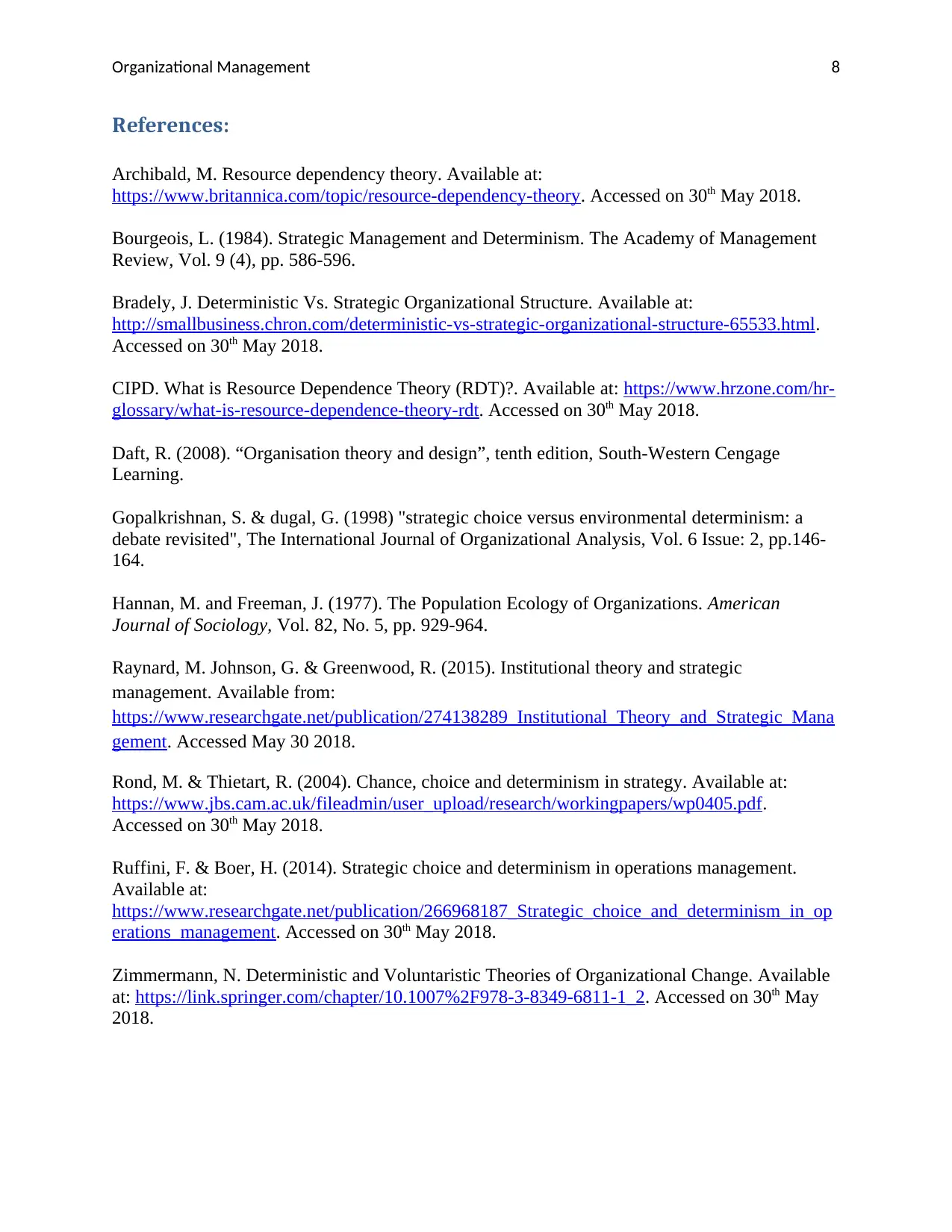
Organizational Management 8
References:
Archibald, M. Resource dependency theory. Available at:
https://www.britannica.com/topic/resource-dependency-theory. Accessed on 30th May 2018.
Bourgeois, L. (1984). Strategic Management and Determinism. The Academy of Management
Review, Vol. 9 (4), pp. 586-596.
Bradely, J. Deterministic Vs. Strategic Organizational Structure. Available at:
http://smallbusiness.chron.com/deterministic-vs-strategic-organizational-structure-65533.html.
Accessed on 30th May 2018.
CIPD. What is Resource Dependence Theory (RDT)?. Available at: https://www.hrzone.com/hr-
glossary/what-is-resource-dependence-theory-rdt. Accessed on 30th May 2018.
Daft, R. (2008). “Organisation theory and design”, tenth edition, South-Western Cengage
Learning.
Gopalkrishnan, S. & dugal, G. (1998) "strategic choice versus environmental determinism: a
debate revisited", The International Journal of Organizational Analysis, Vol. 6 Issue: 2, pp.146-
164.
Hannan, M. and Freeman, J. (1977). The Population Ecology of Organizations. American
Journal of Sociology, Vol. 82, No. 5, pp. 929-964.
Raynard, M. Johnson, G. & Greenwood, R. (2015). Institutional theory and strategic
management. Available from:
https://www.researchgate.net/publication/274138289_Institutional_Theory_and_Strategic_Mana
gement. Accessed May 30 2018.
Rond, M. & Thietart, R. (2004). Chance, choice and determinism in strategy. Available at:
https://www.jbs.cam.ac.uk/fileadmin/user_upload/research/workingpapers/wp0405.pdf.
Accessed on 30th May 2018.
Ruffini, F. & Boer, H. (2014). Strategic choice and determinism in operations management.
Available at:
https://www.researchgate.net/publication/266968187_Strategic_choice_and_determinism_in_op
erations_management. Accessed on 30th May 2018.
Zimmermann, N. Deterministic and Voluntaristic Theories of Organizational Change. Available
at: https://link.springer.com/chapter/10.1007%2F978-3-8349-6811-1_2. Accessed on 30th May
2018.
References:
Archibald, M. Resource dependency theory. Available at:
https://www.britannica.com/topic/resource-dependency-theory. Accessed on 30th May 2018.
Bourgeois, L. (1984). Strategic Management and Determinism. The Academy of Management
Review, Vol. 9 (4), pp. 586-596.
Bradely, J. Deterministic Vs. Strategic Organizational Structure. Available at:
http://smallbusiness.chron.com/deterministic-vs-strategic-organizational-structure-65533.html.
Accessed on 30th May 2018.
CIPD. What is Resource Dependence Theory (RDT)?. Available at: https://www.hrzone.com/hr-
glossary/what-is-resource-dependence-theory-rdt. Accessed on 30th May 2018.
Daft, R. (2008). “Organisation theory and design”, tenth edition, South-Western Cengage
Learning.
Gopalkrishnan, S. & dugal, G. (1998) "strategic choice versus environmental determinism: a
debate revisited", The International Journal of Organizational Analysis, Vol. 6 Issue: 2, pp.146-
164.
Hannan, M. and Freeman, J. (1977). The Population Ecology of Organizations. American
Journal of Sociology, Vol. 82, No. 5, pp. 929-964.
Raynard, M. Johnson, G. & Greenwood, R. (2015). Institutional theory and strategic
management. Available from:
https://www.researchgate.net/publication/274138289_Institutional_Theory_and_Strategic_Mana
gement. Accessed May 30 2018.
Rond, M. & Thietart, R. (2004). Chance, choice and determinism in strategy. Available at:
https://www.jbs.cam.ac.uk/fileadmin/user_upload/research/workingpapers/wp0405.pdf.
Accessed on 30th May 2018.
Ruffini, F. & Boer, H. (2014). Strategic choice and determinism in operations management.
Available at:
https://www.researchgate.net/publication/266968187_Strategic_choice_and_determinism_in_op
erations_management. Accessed on 30th May 2018.
Zimmermann, N. Deterministic and Voluntaristic Theories of Organizational Change. Available
at: https://link.springer.com/chapter/10.1007%2F978-3-8349-6811-1_2. Accessed on 30th May
2018.
1 out of 8
Related Documents
Your All-in-One AI-Powered Toolkit for Academic Success.
+13062052269
info@desklib.com
Available 24*7 on WhatsApp / Email
![[object Object]](/_next/static/media/star-bottom.7253800d.svg)
Unlock your academic potential
Copyright © 2020–2026 A2Z Services. All Rights Reserved. Developed and managed by ZUCOL.



